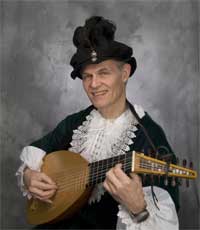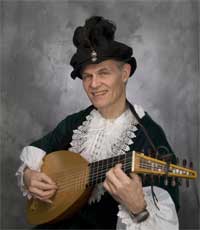 Physicist Pulls Strings
Physicist Pulls Strings
A nightingale sings. In fact, Physics Professor Peter Nightingale of Kingston not only sings, he plays the Renaissance lute. Two of them actually, a tenor and a bass lute.
“I love the sound of the lute and Renaissance music in particular. I originally chose the guitar because one of my fellow graduate students in theoretical physics advised me to choose a harmonic instrument rather than the flute, in which I had expressed an interest,” Nightingale recounted. “His argument was that a harmonic instrument could be played as a solo instrument and did not require either phenomenal skill or an ensemble. That was good advice, given that theoretical physicists tend not be particularly gregarious.”
Nightingale started singing self-accompanied lute songs about 10 years ago. Since 2003, he has been singing and playing the lute as an Elizabethan character named Marteyn van Ockeghem, Marty Ock for short, during the annual King Richard’s Faire, a Renaissance fair held in Carver, Mass., which starts on Labor Day weekend and continues into mid-October.
“Whether I sing and play, or just play at the Faire depends on my voice and also on my mood,” he said. “I can play endlessly, but that isn’t true for singing, because I use a countertenor (male alto) voice, which is hard work. The sound can also be hard on the audience, which for the most part has never heard a guy sing such femininely high notes.”
Nightingale sings with the URI Concert Choir, which typically performs three times a year in the URI Concert Hall, and also takes voice lessons with URI’s PREP Program.
He plays the lute daily with few exceptions. “One side of my brain does physics; the other side does music. Extended family and friends have to make do with the rest,” said the physicist/musician with tongue firmly planted in cheek.
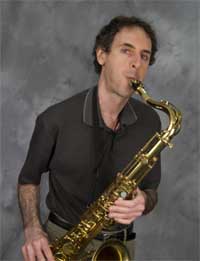 Engineering Jazz
Engineering Jazz
When Michael Greenfield of Providence, associate professor of chemical engineering and Victor J. Baxt Chair of Polymer Engineering, isn’t using molecular simulation techniques to study polymers and liquids, he’s arranging, composing, or playing jazz.
“Music gives me a creative outlet that is distinct from my technical research and my teaching; I find it relaxing,” he explained. “I initially chose clarinet for the very naive reason that it resembled a recorder, which I had liked in music class. I later started on saxophone because I wanted to play jazz, and that was much more possible on saxophone.”
Although he played in a classical woodwind trio and a folk/rock band in college, Greenfield finds his strongest emotional connection is to jazz. He especially enjoys ensemble music that emphasizes complex harmonies and rhythms—groups such as the Boston-based Either/Orchestra and the Washington, D.C.,-based Windmill Saxophone Quartet.
The chemical engineer plays tenor and baritone saxophone, the clarinet, and the flute in Joe Parillo’s Big Band, which performs Monday nights at the True Brew Cafe in Wakefield. He often participates in jazz jam sessions there on Sunday nights, sometimes playing his own compositions.
During the academic year, Greenfield plays with other groups run from within URI’s jazz studies program, which Parillo heads.
When asked if his musical ability was inherited, the professor replied: “My dad always jokes that he can play the radio. I was influenced a lot by an uncle who played the guitar professionally,” he said. “Now I’m hoping to provide a similar influence on my own nephew and nieces.
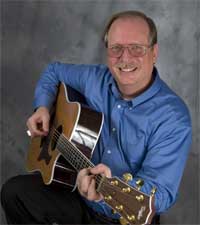 Communicating Performer
Communicating Performer
Steve Wood of Wakefield, professor of communication studies and film media, started playing the piano in first grade, switched to the cello in third grade, switched to the bass and guitar in high school, and started a folk trio that played in Southern California for four years.
He continues to play the guitar and bass, but also plays the mandolin (including an octave mandolin, banjo—4, 5, and 6-strings models), the hammered dulcimer, and the Native American flute. With the exception of the piano and cello, all the other instruments are self-taught.
“I chose the guitar early because of the pervasiveness of the folk music craze of the ’60s, and it was the only instrument I could play better than my father, who was a talented jazz musician,” he explained.
Wood plays folk music, a touch of bluegrass, traditional, old time, and a bit of the blues. He performs locally from Westerly to Newport to Warwick—sometimes solo, or with his friend Joe Miller, or with the Cognitive Dissidents-a trio of URI faculty singing songs of social justice. On a few occasions, he performs with Joe Parillo, URI’s director of jazz studies. During the summer, the professor and Jon Dember play Saturday mornings at the Coastal Growers Market held at Casey Farm in North Kingstown. Calling themselves the Rusty Scuppers, Wood recently joined Joe Miller, Gene Alesandrini, and his brother, Doug, to record a CD of songs about the sea called Drunken Sailor, one of four CDs by Wood produced and published by Neoga Records.
“Music is creative and challenging. It keeps the cranial synapses firing,” said the communicating musician. “And I’m thrilled when I see people in the audience enjoying the music.”
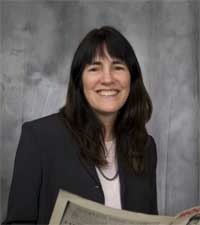 Voicing Joy
Voicing Joy
Lisa Harlow of Exeter, professor of psychology and a multivariate statistician, has long been interested in music, taking piano and violin lessons for a number of years. Although she no longer plays the violin, she continues to tickle the ivories at home.
In recent years, she has been singing in the choir at Kingston Congregational Church, serving on both the church music committee and a church concert series committee.
Harlow has been taking voice lessons for the past two years from mezzo soprano Valerie Nicolosi, training to sing opera arias, Broadway show tunes, and more. While she enjoys belting out such songs as “When I Fall in Love,” “Moon River,” and “Blue Moon,” she’s beginning to like operatic arias such as “Porgi Amor” by Mozart and “O Mio Babbino Caro” by Puccini.
Harlow credits her musical interests to family tradition. Her family tree includes a grandfather who lived to be 97 and who played the banjo, accordion, bass fiddle, and piano for much of his life. He went blind in the early ’60s from a childhood accident that weakened his eyes, but he used the setback as motivation to get back to his beloved music, forming two musical groups and performing at adult centers.
“Music is the connective fluid that sustains my everyday life,” explained Harlow, who often organizes musical events, mostly sing-alongs, for the Psychology Department. “Music makes me more centered and balanced, music, to me, seems like a flowing expression of joy.”
URI photos by Nora Lewis

